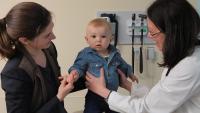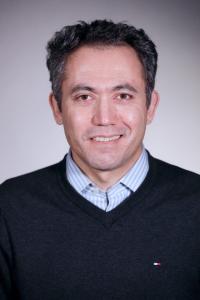Clinical Genetics

Division Chief
Overview
The mission of the Division of Clinical Genetics is to provide excellent, comprehensive care to patients and families with known genetic or suspected genetic disorders. We provide care for newborns, children, adults, and pregnant women in the New York City metropolitan region and beyond. Our division offers comprehensive clinical services, cutting-edge genetic testing programs for difficult to diagnose genetic disorders, and clinical trials for new treatments for genetic disorders.
Our services include clinical evaluation and risk assessment, genetic counseling, and genetic testing. We also provide ongoing care for patients with genetic conditions, coordinate multidisciplinary care, and help patients access resources related to their condition. When appropriate, we identify research studies for which patients may qualify to understand their condition better or access new treatments in clinical trials. For patients planning their families, we provide reproductive options for having healthy children.
Clinical Services
Our team of highly specialized, internationally recognized physicians, genetic counselors, and nurse practitioners provide clinical services to children and adults with complex disorders including autism, epilepsy, congenital heart disease, cardiac disease, birth defects, cancer, neurofibromatosis, von Hippel Lindau, skeletal dysplasias, eye diseases, hearing loss, intellectual disability, and a wide variety of rare genetic disorders.
The skilled physicians in our division provide comprehensive genomic testing that may not be available or is difficult to access at other institutions. We frequently use exome or genome sequencing to facilitate diagnoses in complex cases, and we offer a second-opinion service to reassess previously performed genomic tests to evaluate patients with undiagnosed disorders.
Division members participate in several multidisciplinary programs with a team of specialists.
- The multidisciplinary Craniofacial Program includes geneticists and genetic counselors as well as plastic surgeons, maxillofacial surgeons, otolaryngologists, dentists, occupational therapists, and speech therapists.
- Through the multispecialty Vascular Anomalies Program for infants and children with vascular diseases, we work closely with pediatric dermatologists, interventional radiologists, hematologists, and plastic surgeons.
- We provide collaborative, specialized care through our centers of excellence for neurofibromatosis, von Hippel Lindau, and Marfan syndrome.
- Our clinical geneticists collaborate with cardiologists to care for patients with pediatric cardiomyopathies, pulmonary hypertension, congenital heart disease, and other cardiac conditions.
- We provide accurate cancer risk information and genetic counseling to individuals with a family or personal history of cancer through our Cancer Genetics Counseling Program and PIPSeq program for children with cancer.
- Infants and children with rare and undiagnosed diseases receive comprehensive diagnostic services and cutting edge treatment through our DISCOVER program.
A subsection of our division is focused on genetic metabolic diseases, many of them detected through state-mandated newborn screening programs. These infants, children, and adults are cared for through our Inherited Metabolic Disease Program.
Members of our division also provide inpatient consultations for newborn infants, children, and adults, mainly through the neonatal intensive care unit (NICU) and pediatric intensive care unit (PICU). Genetic evaluation and diagnosis are integral parts of the care we offer to patients born with congenital malformations, and neurologic and neuromuscular disorders. Early diagnosis provides information that can inform the patient's clinical management.
Research
The division collaborates on a number of ongoing and diverse precision medicine initiatives at Columbia University Irving Medical Center (CUIMC) across the range of genetic conditions.
We work collaboratively with many groups around the US and around to world to expand newborn screening for genetic disorders, facilitate genetic and genomic testing on scale, identify novel genes for diseases, describe the natural history of rare genetic conditions, and develop new treatments and supports for patients with rare genetic diseases. Our research portfolio extends from basic genetic discoveries and understanding genetic mechanism to implementation science and clinical trials of new treatments including gene therapy.
Education
Fellowship Program
Our division is accredited by the ACMGE (Accrediting Council for Graduate Medical Education) to train physicians with a minimum of two years prior training in any ACGME-accredited residency program, and we accept one fellow in medical genetics each year for training. Our two-year program has maintained ACGME accreditation since it was established in 1999. The first 18 months are dedicated to clinical training. Residents rotate through various program subsections including pediatric genetics, biochemical genetics, cytogenetics, molecular genetics, and cancer genetics. Fellows dedicate the remaining six months to research. Training includes intensive didactic lectures taught by faculty in the division and faculty from various departments at CUIMC. Fellows actively participate in weekly divisional conferences and present and discuss complex cases in their care.
CUIMC is a tertiary institution in the northern Manhattan neighborhood, Washington Heights. By training in an underserved area fellows are exposed to both common genetic conditions such as Down syndrome as well as complex, rare conditions. At the end of their training, graduates from our program are capable of diagnosing and caring for patients with a wide range of genetic problems and are eligible for certification in Clinical Genetics by the American Board of Medical Genetics and Genomics.
Contact Alejandro Iglesias, MD, Program Director, for more information about the fellowship training program.
Student, Resident, and Fellow Rotations in Clinical Genetics
Education is a cornerstone of the division. We offer rotations to genetic counseling students, medical students (including international students), and pediatric residents. Trainees from other CUIMC departments including molecular genetics fellows from the Department of Pathology, maternal-fetal medicine fellows from Obstetrics and Gynecology, and fellows from Internal Medicine, Surgery, and Neurology also rotate in our division. The duration of these rotations varies, though on average trainees spend two to four weeks with our group.







